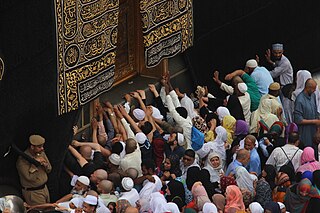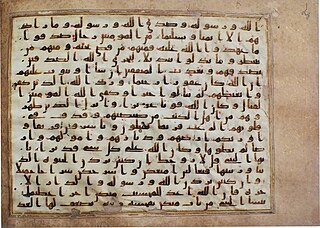
Hadith or Athar refers to what most Muslims and the mainstream schools of Islamic thought believe to be a record of the words, actions, and the silent approval of the Islamic prophet Muhammad as transmitted through chains of narrators. In other words, the ḥadīth are attributed reports about what Muhammad said and did.

Muslims are people who adhere to Islam, a monotheistic religion belonging to the Abrahamic tradition. They consider the Quran, the foundational religious text of Islam, to be the verbatim word of the God of Abraham as it was revealed to Muhammad, the main Islamic prophet. Alongside the Quran, Muslims also believe in previous revelations, such as the Tawrat (Torah), the Zabur (Psalms), and the Injeel (Gospel). These earlier revelations are associated with Judaism and Christianity, which are regarded by Muslims as earlier versions of Islam. The majority of Muslims also follow the teachings and practices attributed to Muhammad (sunnah) as recorded in traditional accounts (hadith).
In Islam, sunnah, also spelled sunna, are the traditions and practices of the Islamic prophet Muhammad that constitute a model for Muslims to follow. The sunnah is what all the Muslims of Muhammad's time evidently saw and followed and passed on to the next generations. According to classical Islamic theories, the sunnah are documented by hadith, and alongside the Quran are the divine revelation (wahy) delivered through Muhammad that make up the primary sources of Islamic law and belief/theology. Differing from Sunni classical Islamic theories are those of Shia Muslims, who hold that Imams interpret the sunnah, and Sufi who hold that Muhammad transmitted the values of sunnah "through a series of Sufi teachers".
People of the Book or Ahl al-kitāb is an Islamic term referring to followers of those religions which Muslims regard as having been guided by previous revelations, generally in the form of a scripture. In the Quran they are identified as the Jews, the Christians, the Sabians, and—according to some interpretations—the Zoroastrians. Starting from the 8th century, some Muslims also recognized other religious groups such as the Samaritans, and even Buddhists, Hindus, and Jains, as People of the Book.

Christianity and Islam are the two largest religions in the world, with 2.8 billion and 1.9 billion adherents, respectively. Both religions are considered as Abrahamic, and are monotheistic, originating in the Middle East.

Ummah is an Arabic word meaning "nation". It is distinguished from shaʻb, which means a nation with common ancestry or geography. Thus, it can be said to be a supra-national nation with a common history.
Kafir is an Arabic term in Islam which refers to a person who disbelieves the God in Islam, denies his authority, rejects the tenets of Islam, or simply is not Muslim and does not believe in the guidance of the Islamic prophet, Muhammad.
In the Middle Ages, Termagant or Tervagant was the name given to a god which European Christians believed Muslims worshipped.
In Islam, a ḥanīf, meaning "renunciate", is someone who maintains the pure monotheism of the patriarch Abraham. More specifically, in Islamic thought, renunciates were the people who, during the pre-Islamic period or Jahiliyyah, were seen to have renounced idolatry and retained some or all of the tenets of the religion of Abraham, which was submission to God in its purest form. The word is found twelve times in the Quran and Islamic tradition tells of a number of individuals who were ḥunafā. According to Muslim tradition, Muhammad himself was a ḥanīf and a descendant of Ishmael, son of Abraham.

Sir William Muir was a Scottish Orientalist, and colonial administrator, Principal of the University of Edinburgh and Lieutenant Governor of the North-West Provinces of British India.
Criticism of Islam, including of Islamic beliefs, practices, and doctrines, can take many forms, including academic critiques, political criticism, religious criticism, and personal opinions.

Hadith studies consists of several religious scholarly disciplines used by Muslim scholars in the study and evaluation of the hadith—i.e. what most Muslims and the mainstream schools of Islamic sects believe to be a record of the words, actions, and the silent approval of the Islamic prophet Muhammad as transmitted through chains of narrators.

Islam is an Abrahamic monotheistic religion centered on the Quran and the teachings of Muhammad, the religion's founder. Adherents of Islam are called Muslims, who are estimated to number approximately 1.9 billion worldwide and are the world's second-largest religious population after Christians.
Mahound and Mahoun are variant forms of the name Muhammad, often found in medieval and later European literature. The name has been used in the past by Christian writers to vilify Muhammad. It was especially connected to the demonization of Muhammad as inspiring a false religion.

The first to criticize the Islamic prophet Muhammad were his non-Muslim Arab contemporaries, who decried him for preaching monotheism, and the Jewish tribes of Arabia, for what they claimed were unwarranted appropriation of Biblical narratives and figures and vituperation of the Jewish faith. For these reasons, medieval Jewish writers commonly referred to him by the derogatory nickname ha-Meshuggah.
Muhammad's views on Christians were shaped through his interactions with them. Muhammad had a generally semi-positive view of Christians and viewed them as fellow receivers of Abrahamic revelation. However, he also criticised them for some of their beliefs. He sent various letters to Christian world leaders inviting them to "Submission to God, Islam". According to Islamic tradition, he interacted with Christians while in Mecca.
In contrast to the views of Muhammad in Islam, the Christian views on him stayed highly negative during the Middle Ages for over a millennium. At this time, Christendom largely viewed Islam as a Christian heresy and Muhammad as a false prophet.

An infidel is a person who is accused of disbelief in the central tenets of one's own religion, such as members of another religion, or irreligious people.

Religious texts, including scripture, are texts which various religions consider to be of central importance to their religious tradition. They often feature a compilation or discussion of beliefs, ritual practices, moral commandments and laws, ethical conduct, spiritual aspirations, and admonitions for fostering a religious community.

An apostle, in its literal sense, is an emissary. The word is derived from Ancient Greek ἀπόστολος (apóstolos), literally "one who is sent off", itself derived from the verb ἀποστέλλειν (apostéllein), "to send off". The purpose of such sending off is usually to convey a message, and thus "messenger" is a common alternative translation; other common translations include "ambassador" and "envoy". The term in Ancient Greek also has other related meanings.










